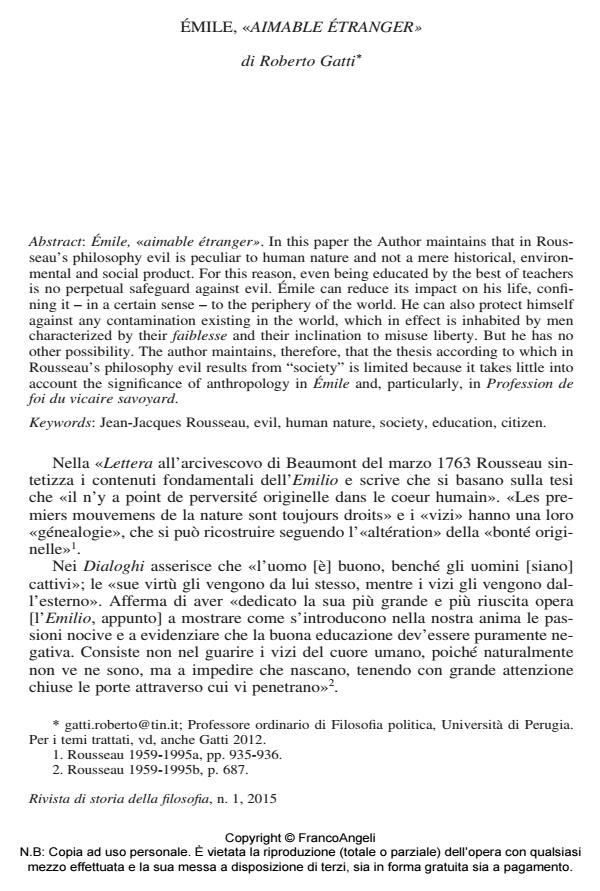Émile, «aimable étranger».
Journal title RIVISTA DI STORIA DELLA FILOSOFIA
Author/s Roberto Gatti
Publishing Year 2015 Issue 2015/1
Language Italian Pages 13 P. 93-105 File size 544 KB
DOI 10.3280/SF2015-001008
DOI is like a bar code for intellectual property: to have more infomation
click here
Below, you can see the article first page
If you want to buy this article in PDF format, you can do it, following the instructions to buy download credits

FrancoAngeli is member of Publishers International Linking Association, Inc (PILA), a not-for-profit association which run the CrossRef service enabling links to and from online scholarly content.
In this paper the Author maintains that in Rousseau’s philosophy evil is peculiar to human nature and not a mere historical, environmental and social product. For this reason, even being educated by the best of teachers is no perpetual safeguard against evil. Émile can reduce its impact on his life, confining it - in a certain sense - to the periphery of the world. He can also protect himself against any contamination existing in the world, which in effect is inhabited by men characterized by their faiblesse and their inclination to misuse liberty. But he has no other possibility. The author maintains, therefore, that the thesis according to which in Rousseau’s philosophy evil results from "society" is limited because it takes little into account the significance of anthropology in Émile and, particularly, in Profession de foi du vicaire savoyard.
Keywords: Jean-Jacques Rousseau, evil, human nature, society, education, citizen
- - Gatti 2012: Roberto Gatti, Rousseau, il male e la politica, Studium, Roma 2012.
- - Gouhier 1977, Henri Gouhier, Filosofia e religione in Jean Jacques Rousseau, tr. it. a cura di di Maria Garin, Laterza, Roma-Bari 1977.
- - Pascal 1956: Blaise Pascal, Pensées, Ed. Jacques Chevalier, Gallimard, Paris 1956.
- - Rousseau 1959-1995a: Jean-Jacques Rousseau, citoyen de Genève, à M. Christophe de Beaumont, in Jean-Jacques Rousseau, OEuvres complètes, Bernard Gagnebin e Marcel
- Raymond, éds., Gallimard, Paris 1959-1995, vol. IV, pp. 927-1030. - Rousseau 1959-1995b, Id., Rousseau juge de Jean-Jacques, Premier Dialogue, in Id., OEuvres complètes, ed.cit., vol.I.
- - Rousseau 1959-1995c, Jean-Jacques Rousseau, Émile, in Jean-Jacques Rousseau, OEuvres complètes, ed.cit., vol. IV
- - Rousseau 1959-1995d: Id., Julie, ou La nouvelle Héloïse, in Id., OEuvres complètes, ed. cit., vol. II.
- - Rousseau 1959-1995e, Id., Discours sur l’économie politique, in, Id., OEuvres complètes, ed. cit., vol. III.
- - Rousseau 1959-1995f, Id., Du contrat social, in Id., OEuvres complètes, ed. cit., vol. III.
- - Rousseau 1959-1995g, Id., Contrat social, première version (Manuscrit de Genève), in Id., OEuvres complètes, ed. cit., vol. II.
- - Rousseau 1959-1995h, Id., Émile et Sophie ou les solitaires, in Id., OEuvres complètes, ed. cit., vol. II.
- - Todorov 1987: Tzvetan Todorov, Una fragile felicità, tr. it. il Mulino, Bologna 1987.
Roberto Gatti, Émile, «aimable étranger» in "RIVISTA DI STORIA DELLA FILOSOFIA" 1/2015, pp 93-105, DOI: 10.3280/SF2015-001008